News & Views
Welcome to Issue No. 2 of the International Bio-Logging Society Newsletter!
We aim to celebrate the global bio-logging community, bringing together stories, events, discoveries, and opportunities from around the world. Our goal is to create an inclusive and welcoming space where everyone’s voice can be heard. This newsletter serves as a bridge, keeping us connected across continents and time zones, and sharing our exciting work.
Reach out, share your stories, and become a part of this vibrant global network!
In This Issue
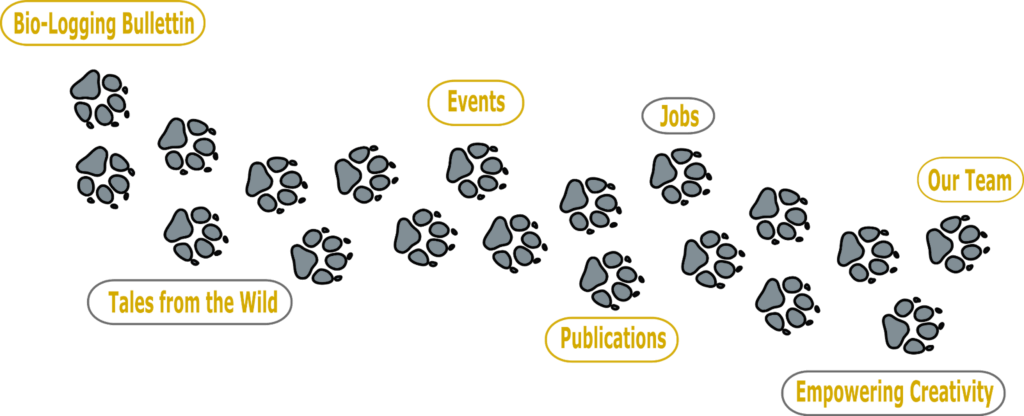
Bio-Logging Bulletin from Our Correspondents
From the International Seabird Group Conference
By Marianna Chimienti
Sofia was awarded the best talk on seabird tracking at the International Seabird Group Conference (September 2–6, 2024, Coimbra, Portugal). Congratulations, Sofia!
“I started my studies at the University of Turin (Italy), far from the ocean, but I fell in love with seabirds along the way. This led me to move to Mallorca (Spain), where I began my PhD at the Animal Demography and Ecology Unit at IMEDEA. Here, I focus on understanding the spatial ecology and demography of seabirds, unraveling how these remarkable creatures navigate the vast and ever-changing seascape.”
Our Interview with Sofia
“Maps and movement tracks caught my attention from the start. I’ve always been curious about where birds go when they’re flying out there. I’m also really passionate about the ocean, and I wanted to understand what guides these birds across such a vast and complex landscape.
Storm-petrels are tiny, elusive birds that nest in places inaccessible to most of us—and sometimes, to light as well. This makes them incredibly challenging to study. My group and I tracked several colonies across the Western Mediterranean using GPS devices, a first step toward understanding where these birds actually go.
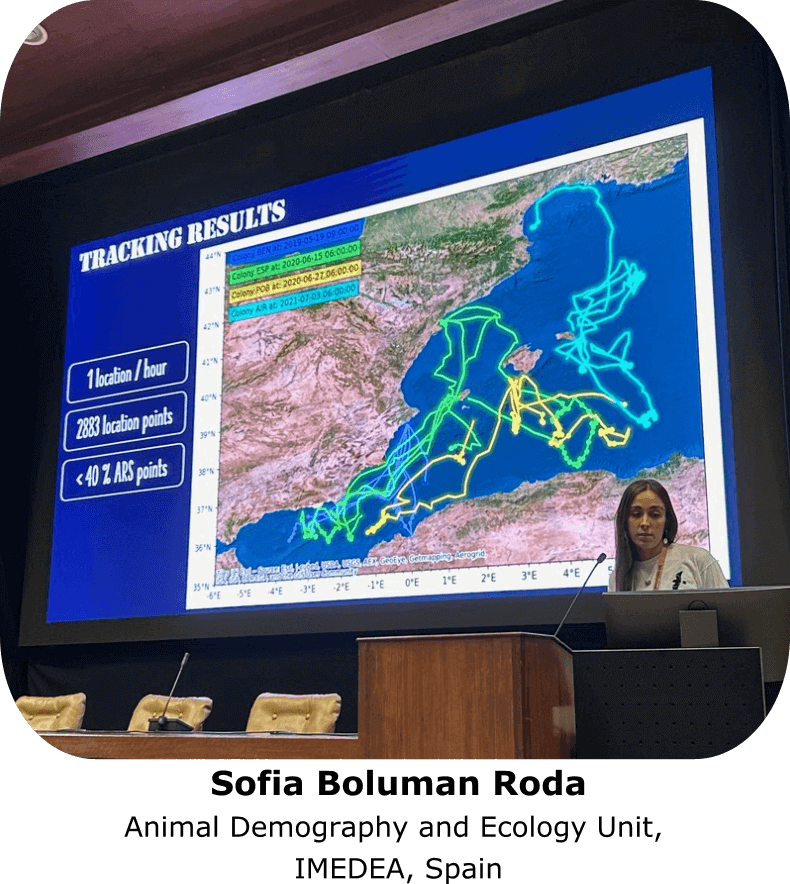
We discovered that storm-petrels prefer to forage in cold, nutrient-rich, shallow, yet dynamic waters. The Alboran Sea, the North African coast, and the Gulf of Lion emerged as key foraging hotspots—a treasure map of their oceanic feeding grounds!

Sofia’s advice to young researchers:
“Get as close as possible to what genuinely excites you, even if it seems out of reach. Passion is a great motivator, and it’s often what will see you through challenging times. Connect with as many people as you can.”
From the British Ecological Society Movement Ecology Meeting 2024
By Amy Feakes and Julie Mestre (University of Southampton, UK)
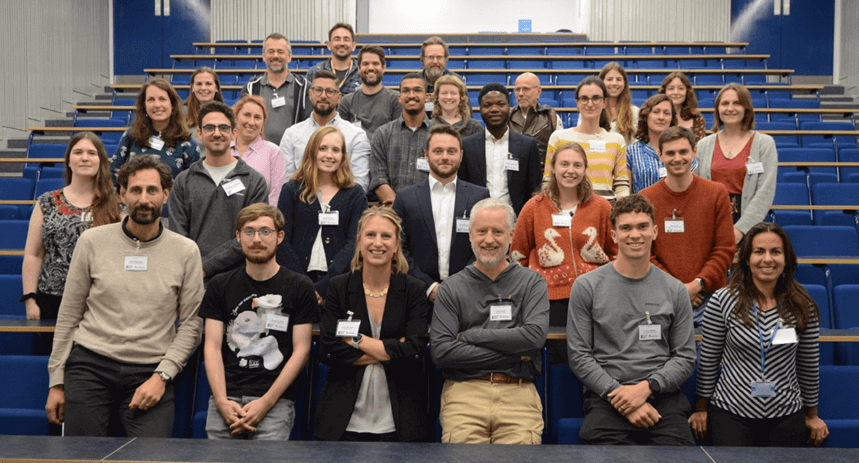
The British Ecology Society Movement Ecology Special Interest Group annual meeting was held 11-12 September 2024. It was organised by Ryan Reisinger, Jorn Cheney, David Sims and Amy Feakes. It brought together 31 attendees from all over the UK and Europe, including many students and early career researchers.
The theme of the meeting, hosted by the University of Southampton, was ‘Swimming, Walking and Flying in a Changing World: Challenges and Opportunities’.
The attendees shared their movement ecology research through four plenaries, ten talks, and twelve posters.
The range of talks at the meeting covered a broad spectrum of topics related to animal movement and ecological responses to environmental change. Presentations included several in-depth studies on species migration, including the spatio-temporal migration patterns of barn swallows and the migratory movements of pollinating bats across North America. Research on marine species was well-represented, with talks on the effects of extreme heatwaves and deoxygenation on oceanic sharks, and the movement strategies of marine predators in tidal stream environments.
Posters included studies on green turtle movement patterns at a key foraging site, the behavioural responses of blue sharks to changing oxygen levels, long-term tracking of common buzzards, and methods for quantifying the connectivity of newly planted woodlands.
Throughout the conference there was time set aside for open discussion to bring new and developing topics to the table. Discussions considered a greater use of data integration and the shift from correlative to mechanistic models. The lack of 3D habitat models for marine and aerial species was also highlighted, emphasizing the need to account for vertical movements, such as those seen in birds and marine animals.
The 2025 BES Movement Ecology meeting will take place at the University of East Anglia, Norwich, UK.
Tales from the Wild: Bio-Loggers in Action
“Hello! I am Margherita Panzuto, a second-year PhD student at the Stazione Zoologica Anton Dohrn (Italy), working in the Marine Animal Conservation and Public Engagement (CAPE) department. My research focuses on tracking the post-nesting journeys of loggerhead sea turtles (Caretta caretta) in the Western Mediterranean. For my project to work out, I need sea turtles, which means fieldwork!

If you ask me how that was, I’d say it was one of the best parts of my research.”
“My first fieldwork experience took place last summer along the coastline of Cilento National Park in Southwest Italy. Here, loggerhead sea turtles have just recently begun nesting. In over just two weeks, our team successfully located five new females and equipped them with GPS satellite tags.
Witnessing female loggerheads nesting was one of the most thrilling experiences of my life and I am very excited to know that, thanks to the satellite tags deployed, I will be able to follow their journeys.
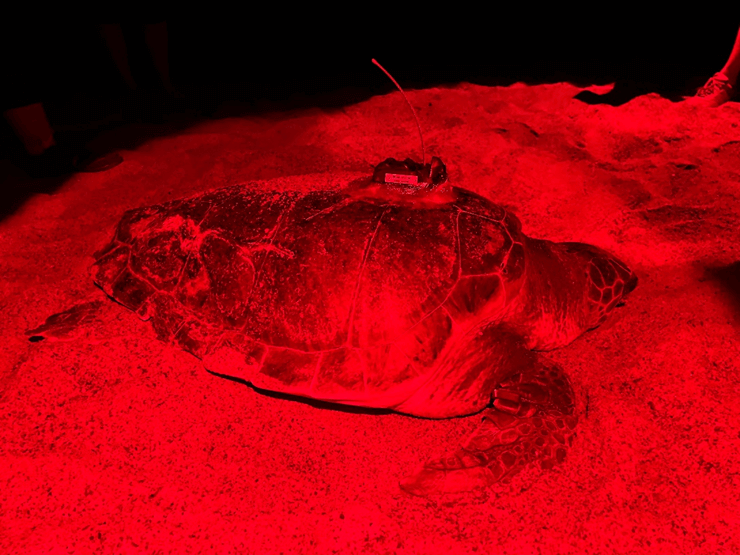
Satellite data will help me to shed light on the key foraging grounds used by this emerging nesting population, as well as understand how environmental and oceanographic factors influence their movement and habitat selection. In the photo, you can see Turtle Antonella proudly carrying her new satellite tag! She was located in July 2024 along the coast of Ascea (SA), SW Italy.
After three nesting attempts over multiple nights, she finally nested and happily returned back into the sea. Her last GPS position was recorded in the deep waters of the Tyrrhenian Sea! I’m extremely grateful to my supervisor, Dr. Sandra Hochscheid, for her crucial role in the field.
A huge thank you as well to Dr. Fulvio Maffucci, Érica Moura, Roberta Teti, Giuseppe Piccolo, and the entire volunteer team who joined us and contributed to this project.”
Upcoming Events
- 35th Annual Research Seminar, Wildlife Institute of India, October 5-6 2024, Dehradun. The recordings are available online.
- The Wildlife’s Society 31st Annual Conference, October 19-23 2024, Baltimore, MD.
- 25th Biennial Conference on the Biology of Marine Mammals, November 11-15 2024, Perth, Western Australia.
- British Ecological Society – Annual Meeting – December 10-13 2024, Liverpool, UK.
- Association for the Study of Animal Behaviour (ASAB) – Winter Meeting – December 12-13 2024, Edinburgh, UK.
- Joint meeting of the Waterbirds Society and the Pacific Seabirds group, January 6-9 2025, San Jose, Costa Rica.
- Wolves Across Borders, June 2-6 2025, Luntheren, the Netherlands.
Publications
Since our last newsletter there have been 37 bio-logging papers published (based on a Web of Science search using the keywords “bio-telemetry” OR “biologging” OR “bio-logging” OR “biotelemetry” OR “animal-borne”).
These papers range from understanding the ecology of species to the impacts of tagging.
Here are some examples of the work going on in our community:
- Development of a multisensor biologging collar and analytical techniques to describe high-resolution spatial behavior in free-ranging terrestrial mammals
- The vulnerability of sharks, skates, and rays to ocean deoxygenation: Physiological mechanisms, behavioral responses, and ecological impacts
- Long-term effects of tagging fishes with electronic tracking devices
- Bio-logging shows a central trans-Saharan migration and unknown wintering grounds in Africa of a juvenile griffon vulture from Spain
Job Opportunities
Are you hiring or have a job to share? Write to us and we will post your job!
- Georgia College State University – Assistant Professor – Ornithology
- Leibniz Institute of Freshwater Ecology and Inland Fisheries – Group Leader – Fish Ecophysiology
- Leibniz Institute of Freshwater Ecology and Inland Fisheries – Group Leader – Fish Movement Ecology
- Notre Dame, Indiana – PosDoc – Behavior/Stress Responses/Heart rate in wild baboons
- Cornell Lab of Ornithology, New York – PostDoc – Migration, Ornithology
Useful Websites:
- Academic Jobs Online
- Euraxess
- Pacific Seabird Group Job Board (with links to other resources)
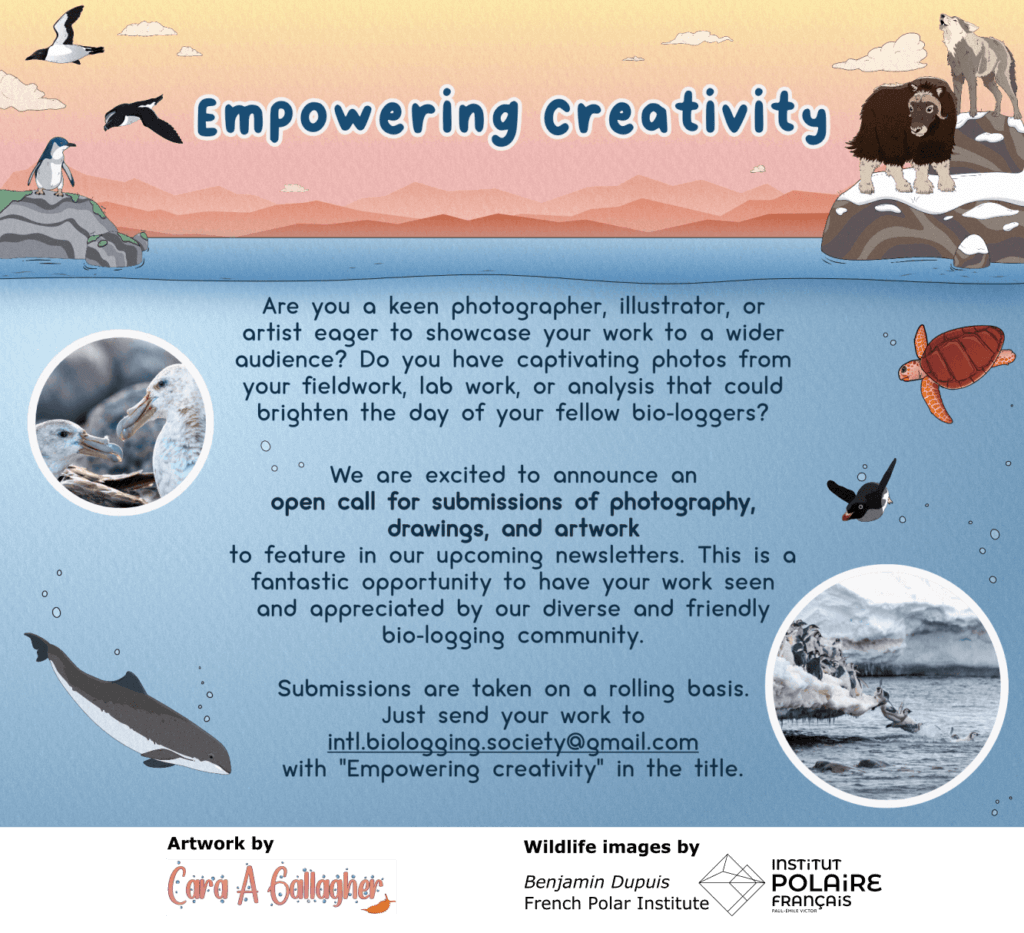
Behind the Scenes: Our Communication Team
Top row (L to R): Marianna Chimienti, Luciana Cerqueira Ferreira, Maria Guerisoli, Sheanna Steingass
Bottom row (L to R): Alison Stimpert, Marlee Tucker, Leena Riekkola, Nyambayar Batbayar
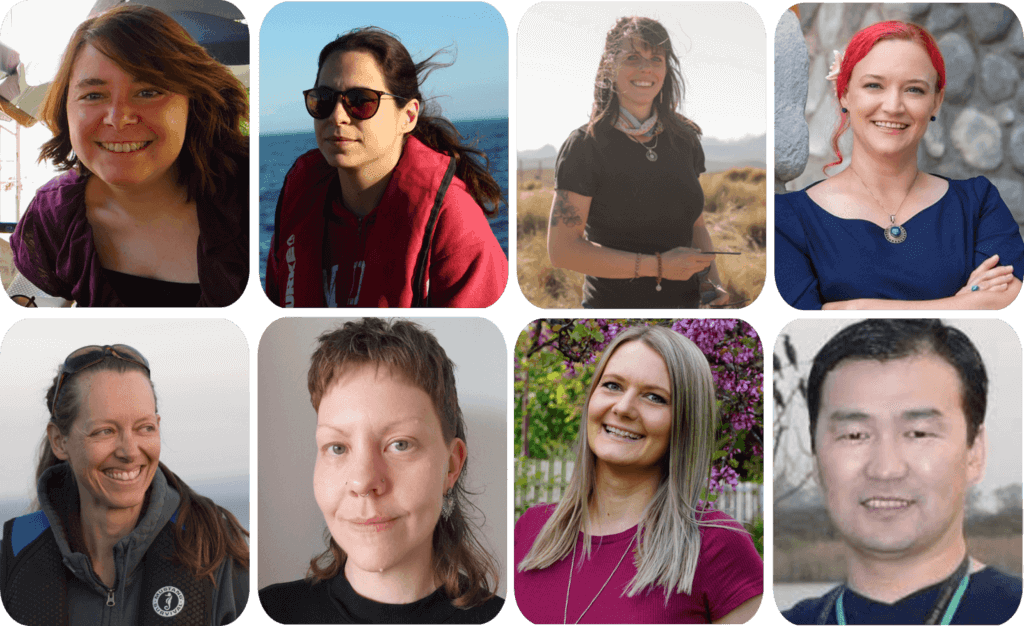
Stay tuned for the next newsletter in three months!
We are thrilled to have you as part of our community. For inquiries or contributions, contact intl.biologging.society@gmail.com.
Don’t get lost—(bio)-log yourself into this diverse community!
